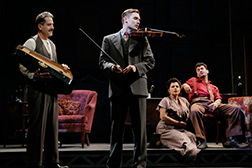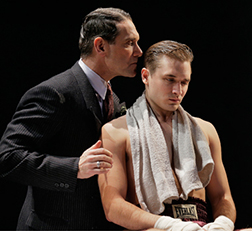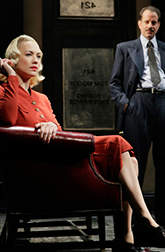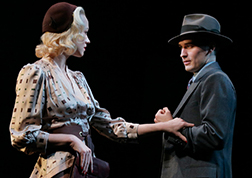By Lucy Komisar
Clifford Odets‘ stylized naturalism combined with sometimes faux poetics often edges close to melodrama in his 1937 play about the conflict between art and money. The dialogue doesn‘t wear well with time and might seem almost ridiculous on stage today. But director Bartlett Sher makes it all believable with a strong and respectful staging. This production is still a powerful moment in theater and one of the best plays by an historically significant American playwright. And the politics of the play still matters.

It‘s 1936 in New York. Joe Bonaparte (Seth Numrich) is a young man of 21 from an Italian family trying to make it through the Depression. These people are working/lower middle class. Joe has studied the violin for ten years and won a city-wide medal and a scholarship. His proud father (Tony Shalhoub) spends $1200, a massive amount in those days, to buy him a fine violin. But Joe wants to make money and discovers he can do it as a boxer. Numrich gives an excellent performance; he is Joe Bonaparte.
There are conflicts about morality, although sometimes the definitions are skewed. Mr. Bonaparte (Shalhoub) attacks Italians who are wealthy contractors or grafted politicians. Shalhoub is terrific as the sensitive father devoted to his son‘s future and success as an artist. However, his sensitivity is narrowly placed. He tells his son-in-law Siggie (Michael Aronov), “You hit your wife in private, not in public.” Odets uses the leftwing intellectual, nihilistic, Schopenhauer-reading neighbor Carp (Jonathan Hadary) to admonish, “A man hits his wife, it‘s the first step to fascism.”

There‘s a relationship here between values and the clouds of war gathering in Europe that establish a backdrop for violent attitudes at home. They are represented by the undercurrent pulling Joe from art to the dirty world of boxing represented by Eddie Fuseli (Anthony Crivello), a mafioso who muscles in to buy a piece of Joe‘s contract. Crivello is tough, square faced, and carries a garish white coat that makes him a caricature of a TV Soprano. It is Eddie who nicknames Joe “the Golden Boy,” meaning he will bring in cash.
But Joe is not innocent. He gravitates to Fuseli, the crook representing allegiance to cash in opposition to the father who stands for love of art. The conflict is heighted in the gym when both older men speak in Italian and argue over who will own Joe‘s soul. After Joe becomes a boxer, his father tells him, “It‘s too late for music. Men must be free for music.”
Ranged against Fuseli is Joe‘s older brother Frank (Lucas Caleb Rooney), an organizer for the CIO, who is working with textile workers. Are you too young to know that the CIO is the Congress of Industrial Organizations, which represented factory workers and later merged with the American Federation of Labor, which represented skilled craftsmen, to form the AFL-CIO? This was in the era before the 1%, through legislation and goons, largely destroyed the organizations that defend the rights of America‘s working people.

Odets’ women are stereotypes. Anna (Dagmara Dominczk), Joe‘s sister, who is married to Siggie, a struggling aggressive frenetic cab driver, is crazy about him and lets herself be pushed around. Lorna Moon (Yvonne Strahovski), the secretary and lover of Tom Moody (Danny Mastrogiorgio), Joe‘s fight manager, stays with him even though she doesn‘t love him, because he loves her and needs her. Lorna is so damaged from past, she believes she has no right to her own happiness and is just grateful Tom rescued her. And Roxy (Ned Eisenberg), a fight promoter, is blatantly sexist. So maybe Odets drew those figures on purpose.
At one point Joe‘s trainer Tokio (Danny Burstein) tells him, “Your heart ain‘t in fighting, your hate is. Find something to love.” He does.
Joe says his nature isn‘t fighting and talks with Lorna about souls. He declares, “In the street, there is rot.” But she tells him, settling for little, “All I want is peace and quiet, not love.” Still, later she will tell him, “We‘ll find some city where poverty‘s no shame.” Strahovski is strong as Lorna, the tough outside, soft inside broad from Newark who sports a Runyanesque Jersey accent.

Later we see Frank who has returned from the south, his head bandaged after he‘s been beaten by company thugs. He declares, “I fight for what I believe in,” establishing the distinction between him and Joe.
In his own life Odets struggled, over choosing money over art. He went to Hollywood to make big bucks. But he wrote this play to help the struggling Group Theatre of which he was a member and which produced his important political plays. In Golden Boy, Odets reflected his own personal conflicts.
Designer Michael Yeargan has produced strong, evocative sets, a brick apartment building backdrop and the dark brown seedy fight gym. Thirties jazz mixes with the sounds of violin playing and boxing. This production was a fine choice by Lincoln Center Theater.
“Golden Boy.” Written by Clifford Odets; directed by Bartlett Sher. Lincoln Center Theater at the Belasco Theatre, 111 West 44th Street, New York City. 212-239-6200 Opened Dec 6, 2012; closes Jan 20, 2013. 12/31/12.

